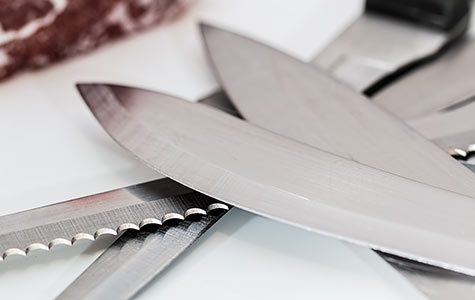
Kitchen safety makes cooking much easier and more enjoyable. It’s no fun if people get hurt while you are creating culinary delights. The best place to start with kitchen safety is with a few really good basic kitchen safety tips:
Knives
- Need be sharp
- Put away in a safe place when not in use
- Hand wash and use extra care when washing
- Do not put in a sink of water
- Wash with warm soapy water, sharp edge away from you
- Dry and put away (flat) immediately after use
- Always cut away from your body when using a knife, peeler, scissors or any sharp object.
- Don’t try to catch knives or other sharp objects if they fall- just get out of the way
Use the right tool for the job
- Know what the right tool for the job is
- Learn how to use it (read the instructions and follow them)
Small Appliances
- Check that electrical cords and appliances are in good repair
- Be sure they are not where they could get wet, tangled or pulled by children
- No extension cords in the kitchen
- Do not stick metal objects (like forks) into toasters, mixing bowls, food processors. If you must retrieve food or clean the sides of a bowl, unplug the appliance first and use a non-metal object.
General Kitchen Safety
- Keep small children and pets out of the kitchen when using heat or sharp objects
- Clear of toys and other stuff
- Clean up all spills immediately, especially on the floor where they present a real hazard
- Wear clothing that is not flowing and shoes that are sturdy
Cooking care
- Never leave pots cooking food unattended
- Always point pot and pan handles on the stove toward the center of the stovetop
- Make it a habit to use hot pads
Use extra care with HOT OIL
- Use care when adding anything to hot oil, especially anything that has liquid or ice on it
- add things to hot oil with tongs or slotted spoon
- Add foods slowly
- Lift the lid facing away from you and allow the steam to vent and the oil to cool before totally removing the lid – especially if the oil is spattering
Use extra care with STEAM
- Steam burns as fast or faster than hot oil
- Lift the lid (or open the micro bag) facing away from you and allow the steam to vent before totally removing or opening
FIRE:
- Extinguish oil or electrical fires with a pot cover, baking soda or salt– NEVER water
- Keep a fire extinguisher in the kitchen and know how to use it
- If you catch fire: STOP, DROP and ROLL to smother out the fire
- If you can’t get it out fast, leave the house and call the fire department
Cleaning supplies and Medications
- Keep cleaning supplies and medications in safe places, with safety latches if you have children or pets.
BROKEN GLASS
- Clean up broken glass immediately
- First, Lift all large pieces using a paper towel and put into a paper bag (glass penetrates plastic bags easily)
- Sweep using a broom and dustpan with long strokes- put the sweepings into the paper bag
- Go over the floor carefully with a damp paper towel or rag that you can throw away. Throw rag or towels into the paper bag.
- Close the bag and fold over the top a few times before putting into trash bag.
Keep a first aid kit in the kitchen!
- Check it once a year to be sure everything you may need is in there and not expired.
Have the local Poison Control Number handy.
Kitchen Safety is about creating good habits. These may take a while to get used to, but they will soon become second nature. Happy Cooking!

Leave a Reply